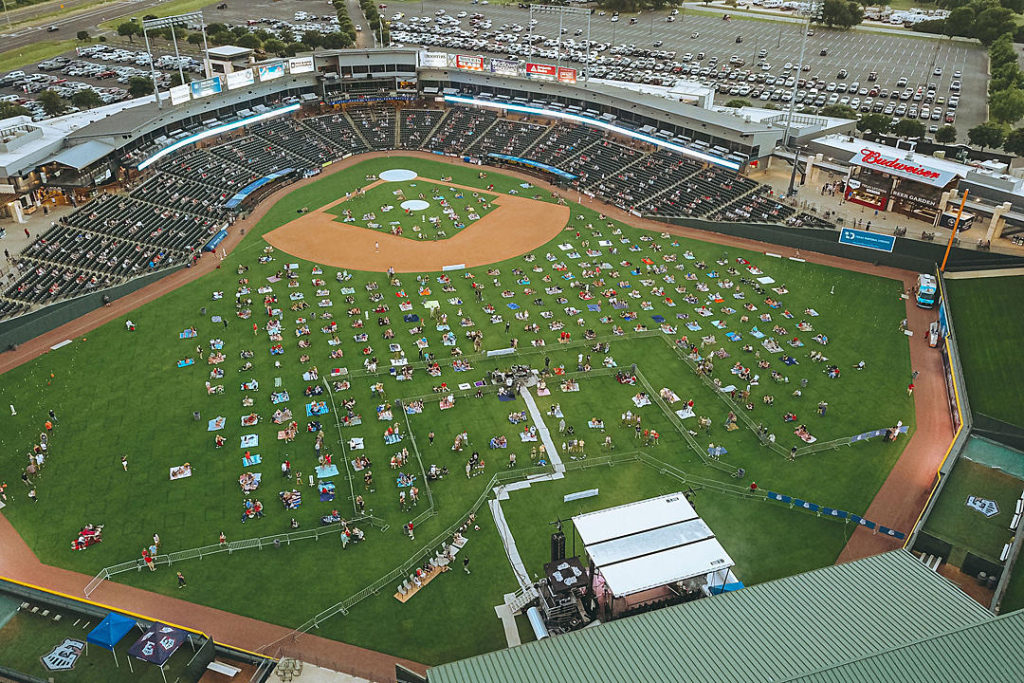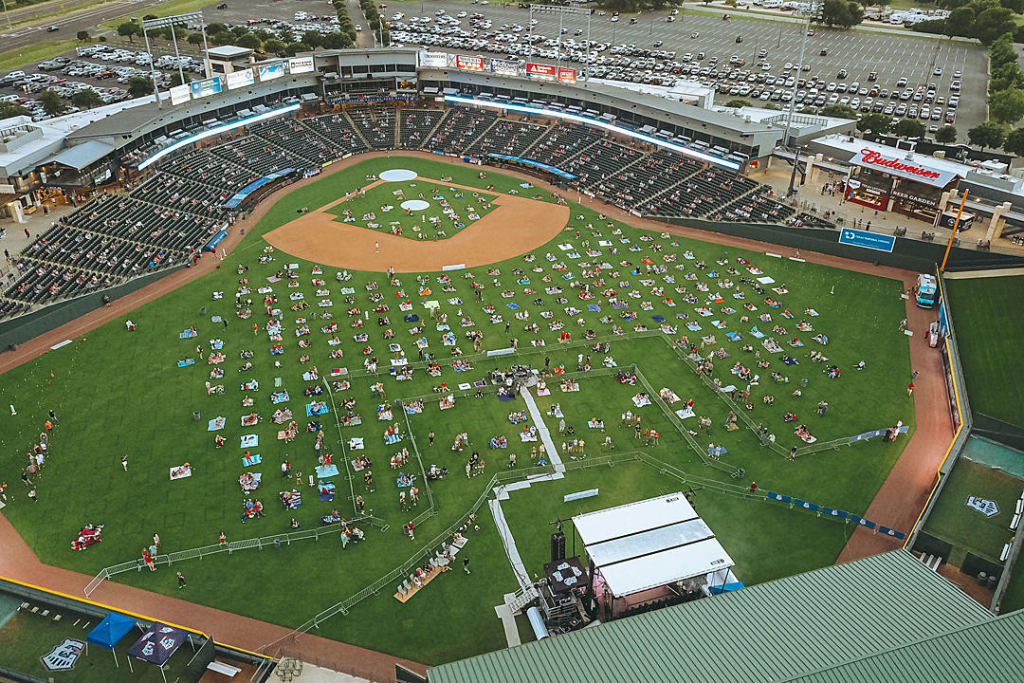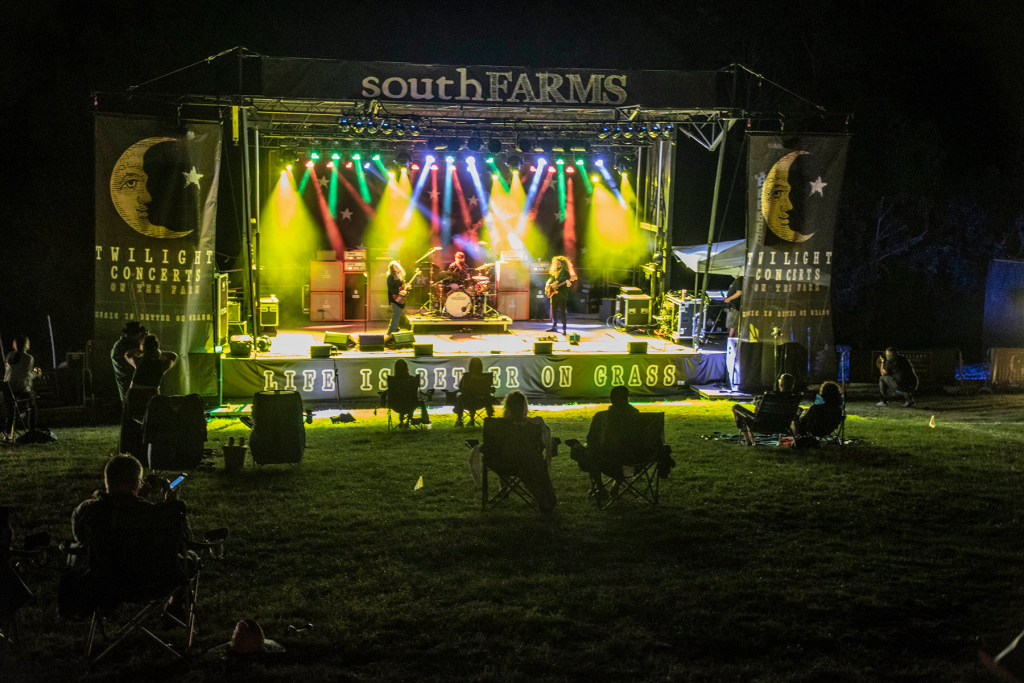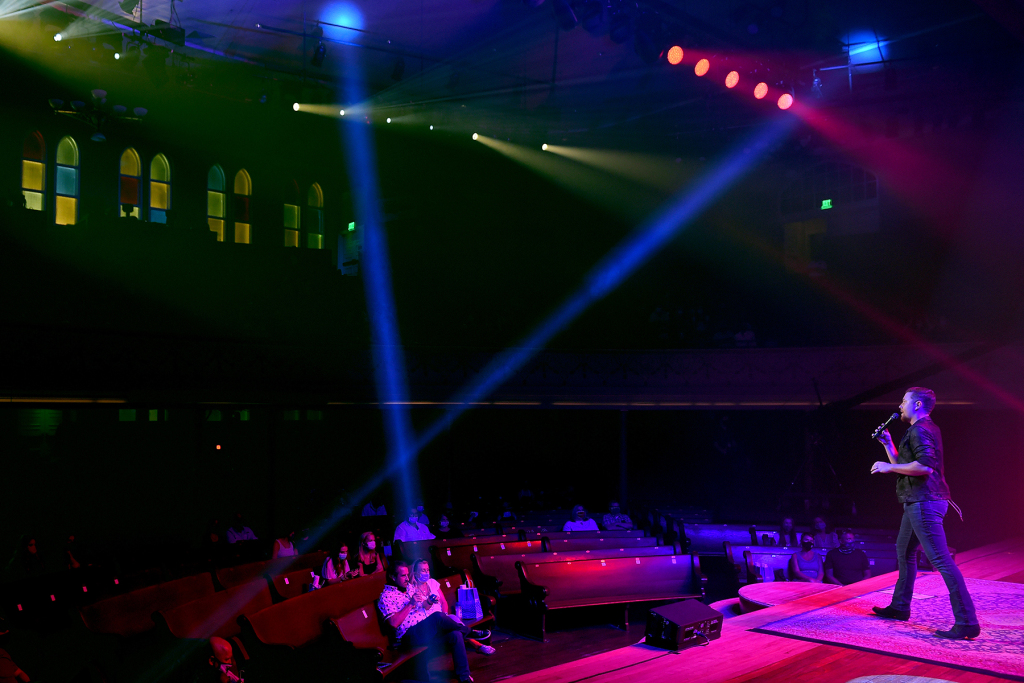Against All Odds, Live Concerts Are Coming Back This Fall – Rolling Stone

Scotty McCreery didn’t have any idea he was playing the Ryman Auditorium’s last pre-pandemic show. For the most part, his March 11th performance at the historic Nashville venue was business as usual, with the country singer turning in a full set of hits for a lively, enthusiastic audience out front. Backstage, however, the vibe was odd and tense.
“We did a media thing before the show, and it was the first time I saw people [bumping] elbows and air high-fives instead of shaking hands and hugging,” McCreery recalls. “Folks I’ve hugged forever, everybody was leery of that.”
Within mere days of McCreery’s Ryman concert, it wasn’t just backstage hangs that had changed. The entire live-music industry had ground to a halt: Tens of thousands of shows and tours were canceled because of the imminent Covid-19 pandemic, and financial losses were estimated in the billions. Pollstar, the trade concert publication, projected that U.S. revenue loss from the stall of live events could total $9 billion in 2020 alone. The concert business was struck dead, with no indication of when it might be revived.
Adding insult to injury, live concerts have been cited by health experts as among the most risky activities for spreading and contracting the virus. Both artists and fans spew aerosols and droplets while singing and shouting, and traditional venues — especially those indoors — can find it difficult, if not impossible, to enact social distancing and maintain good air circulation.
And yet, as we enter the fall season, when fears of a second wave of the virus loom, concerts are somehow returning across the country. Live shows, with actual human beings present, are being staged at drive-ins, in parking lots, at farms, in “pods” in fields, and even indoors.
McCreery himself returned to the Ryman on September 4th to headline the venue’s first limited-capacity concert, part of the auditorium’s hybrid “Live at the Ryman” streaming series. At 125 people, it was a small fraction of the crowd McCreery entertained in March, but it was something. It was, if not exactly normal, a step in that direction. “We’ve never played a show where they’re so spread out, everybody’s wearing masks,” he says. “It was just different. Once we got out there, it was a blast. You couldn’t see their mouths smiling, but you could see their eyes were smiling.”
At a Distance
While many venues remain shuttered and in danger of staying that way permanently, the Ryman and a handful of other spaces, many of which have a stake in country music, are cautiously reopening their doors to varying degrees. Nashville is one of the few cities that loosened Covid restrictions to allow concerts this summer — an allowance that other metropolitan areas including New York and Los Angeles have not yet made. But even entire states are now following suit. On Wednesday, Indiana announced that “indoor and outdoor venues can operate at full capacity.”
All of the partial reopenings are being handled with increased safety measures — such as limited seating or audience capacity, removal of high-touch offerings like bar service and food stands, temperature checks, and mandated masks for audience members and employees — with the aim of reducing the risk of any potential Covid spread for concertgoers, showrunners, artists, and crew alike.
But all those extra measures can be costly, particularly if third-party medical contractors are involved. In the Ryman’s case, the business is relatively protected: As part of a larger corporation that owns several entertainment and hospitality properties, it doesn’t have to worry much about the short-term issue of cash flow, and it can direct resources and finances to exploring options like its livestream-with-audience initiative.
“We looked at it as an opportunity to leverage both technology and a modified or a hybrid model, since we don’t have any ability to pack the house,” says Scott Bailey, president of Opry Entertainment Group, which owns and operates the Ryman.
“Live at the Ryman” kicked off August 14th with the duo For King & Country and was initially a virtual concert series, with no in-house audience. At the same time, Opry Entertainment Group was working closely with the Nashville Public Health Department to define a set of protocols that would allow it to return to hosting live audiences. One week after McCreery’s show, the audience doubled to 250 guests for another country singer, Brett Young. The next week, 400 showed up to see Old Crow Medicine Show. The concerts ran through September 18th, but Bailey says they’re open to adding more if circumstances with the pandemic remain unchanged.
“We’ve built the entire product in a way that an artist can come to us and have a turnkey solution specifically for a hybrid model that includes pay-per-view [and] production,” Bailey says.

Granger Smith performed one of the earliest, successful socially distanced concerts at a ballpark in Round Rock, Texas, in July.
Paul De La Cerda*
Across town, the Grand Ole Opry is gearing up to once again host fans at its 95-year-old radio show. Beginning with the October 3rd broadcast, 500 ticketed guests will be allowed inside the Opry House, the venue announced on Thursday. Physically distanced seating, mandatory masks, designated restrooms, and temperature checks are among the precautions being taken ahead of performances by Dierks Bentley, Vince Gill, Lorrie Morgan, and Terri Clark.
On October 1st, Nashville club 3rd & Lindsley will also reopen, with Eagles and Fleetwood Mac tribute bands on the schedule, and the return of Western-swing band the Time Jumpers‘ Monday-night residency. As at the Opry, capacity limits, social distancing, and mask mandates will be in effect.
Other venues steeped in country history, like the legendary Cain’s Ballroom in Tulsa, Oklahoma, have already resumed live concerts. On August 8th, Warner Bros. Nashville artist Randall King played to a crowd of approximately 300 there — about a sixth of the room’s total capacity. Guests were stationed at bistro tables set up through the room and required to wear masks in and out of the venue.
“We asked them to social distance. They sort of did, they sort of didn’t,” Chad Rodgers, Cain’s general manager, says. “As the show went on, they got more close to the stage than I would have liked, but the band didn’t care.… You can only control them so much. Part of it also is you need the artist to be up there and say, ‘Thanks so much for coming out, but we need you guys to please keep your distance.’”
The following weekend, Cain’s expanded its crowd to 450 for Red Dirt singer Jason Boland. Rodgers says it went “pretty well” and reports more compliance and mask use all around, despite the larger crowd. Ahead on the schedule are Cody Canada, Aaron Watson, and Sunny Sweeney, though many fall tour dates are still in flux. (Often, a show will be listed as active on a venue’s website but canceled on the artist’s site, causing some confusion about who is exactly playing where and when.)
A few hours away, in Fort Worth, Texas, the cavernous honky-tonk Billy Bob’s has also reopened. A sprawling complex of 127,000 square feet, the building can hold 6,000 people. In order to get up and running, the venue petitioned to be recertified as a restaurant — an option that was available because of the numerous food-serving businesses operating under its roof.
“We’re high-tech redneck now, but if that gives us the opportunity to keep our doors open, it was worth the investment.”
When shows started again at Billy Bob’s with the Bellamy Brothers one night and Flatland Cavalry the next, capacity in the building was limited to 1,200, even though Texas laws would have permitted 50 percent of the total (in this case, 3,000). Guests were placed at tables of six to eight, and some general admission was allowed in spaced-out seats on a second level. The venue also invested in a thermal camera to flag anyone entering the premises whose temperature was above a certain level.
“We’re high-tech redneck now, but if that gives us the opportunity to keep our doors open, it was worth the investment,” says Keitha Spears, managing director of branding and marketing for Billy Bob’s.
For the most part, Spears said, guests were willing to comply with masking requirements and stay in their designated areas. The establishment took a hard-line stance on anyone who refused. “Some people were asked to leave because they didn’t want to wear their masks,” Spears says. “That’s not a personal opinion, that’s a Governor [Greg] Abbott mandate and that’s an executive order in Tarrant County. We’re just enforcing the rules. You don’t want a mask? Love you, mean it, come back when that’s not the rule. But you can’t be here.”
The event calendar at Billy Bob’s is surprisingly packed in the months ahead, with Riley Green playing two nights on September 24th and 25th, followed by Aaron Watson, Mike Ryan, Wade Bowen and Randy Rogers, Eli Young Band, and Robert Earl Keen, among others. Other notable Texas venues, like Gruene Hall in New Braunfels and Floore’s Country Store in Helotes, have also begun adding shows. Floore’s has Texas favorites Bowen, Watson, and Pat Green on the books, and a solo show from the Mavericks’ Raul Malo on October 30th, while Granger Smith is set for Gruene on September 26th. The country performer Smith played one of the earliest socially distanced concerts in July, at a Texas minor-league ballpark — a model that the country trio Midland will follow on October 17th, with a limited-capacity, outdoors ballpark show in Frisco, Texas.
“Covid is probably here to stay, and everyone’s going to be assuming some level of risk,” says Midland’s manager Matt Graham, a founding partner of Range Media Partners and its head of music. “But country music is very often an outdoors experience. It’s fairs. It’s sheds. So, for many reasons, I think the country audience is wanting to come back to shows sooner. We’ve done everything that we can to be responsible, and we’ll be extremely considerate of our band and our fans.”
The Texas group Flatland Cavalry played both Cain’s and Billy Bob’s and have a handful of other shows lined up through year’s end, primarily in their home state and Oklahoma. The band wrestled with the decision to return to performing. “We stayed off the road as long as we could,” Cleto Cordero, the band’s frontman, explains, noting that they’re basically a small business with around 10 employees. “Our main concern was people’s safety and social distancing, and I thought, ‘Man, it’s gonna be hard for us to put on a good show and have fun and do our job if we’re having to worry about people doing whatever they want to.’”
So far, Cordero says, venues where Flatland Cavalry have performed have done their part to keep everyone safe, and the limited-capacity audiences generally have been willing to comply with the rules in order to hear a little live music.
“It’s in its infancy of people feeling out these shows, but I believe people want live music to return,” Cordero says. “So, it’s in everyone’s best interests to play it as by-the-rules as you can.”
Taking It Outside
There’s one promising alternative to tricky concert-hall shows: outdoor performances. Whether attended by fans in cars or fans seated in chalk-outlined “pods” six feet apart, these shows — which started bubbling up in the U.S. a few weeks ago as Covid cases scaled slightly back — are more familiar to artists and can offer a crowd energy that is markedly higher than, say, an indoor auditorium filled to only 25 percent capacity.

The Marcus King Trio perform at South Farms in Connecticut.
Sacha Lecca for Rolling Stone
Drive-in shows were the earliest live performances to appear in the pandemic era, with artists like the DJ D-Nice and country star Keith Urban playing to audiences of Civics and Subarus. “Our goal right now is to provide entertainment,” Scott Hayward, owner of the Tupelo Music Hall told Rolling Stone in May. “This is one of those situations where 100 pennies makes a dollar. We’re just gathering as many pennies as we can.” Tupelo charged $75 per car — a price that is a fraction of what it usually charges for live shows, compared by square footage occupied per person. The smattering of drive-in shows sponsored by large corporate brands has been able to target a wider range of price points, but also offers a bigger production budget and a different scale of experience for fans.
Live Nation, the largest concert promoter in North America, debuted a weekend of drive-in shows across Missouri, Tennessee, and Indiana in July that featured Brad Paisley, Jon Pardi, Darius Rucker, and Nelly. The company will continue the experiment in mid-October with shows at Atlanta’s Ameris Bank Amphitheatre from Jason Isbell, Indigo Girls, Blackberry Smoke, and Yacht Rock Revue. Isbell, who this time of year would ordinarily be hosting his annual Ryman Auditorium residency, recently announced three nights of socially distanced shows in October at the Caverns in Pelham, Tennessee. For $125 per person, fans will be seated in outdoor “pods” that can accommodate two, four, or six guests at a time. A fourth concert was added after the initial three quickly sold out.
Colorado’s open-air Red Rocks Amphitheatre has tentatively returned to hosting shows as well, albeit at the extremely reduced capacity of 175 guests. Nathaniel Rateliff held a five-night stand there in mid-September, and Big Head Todd and the Monsters turned in a doubleheader on September 22nd. Dutch DJ Tiesto is slated for September 24th, with Fitz and the Tantrums on September 25th. Other artists are using the scenic venue only as a backdrop: Bluegrass phenom Billy Strings will play a crowdless livestream show on the 26th; Rateliff returns to do likewise on September 30th.
While “touring” in the traditional sense is still off the table, some artists are making do with converted outdoor event spaces. The Christian band the Newsboys announced an outdoor amphitheater and drive-in tour for October, and earlier this month, the blues-jam guitarist Marcus King took his stripped-down trio on the road for a tour of only outdoor venues — including a stop at the Circle Drive-In in Scranton, Pennsylvania, and one at South Farms, a 10-acre, family-run farm in Morris, Connecticut. The boutique farm, which typically hosts events like weddings, fundraisers, and cocktail parties, has converted itself into a grassy concert pit for its series “Twilight Concerts on the Farm,” which will see artists like Neko Case and Warren Haynes touch down next month.
Related Gallery: Marcus King Trio’s Drive-In Tour
“Seeing people not in their cars added a little anxiety for us because we were constantly making sure people were distanced,” King tells Rolling Stone of the group’s show there. “We wanted to make sure this tour didn’t fail and wanted to make sure people were safe and healthy. Morris did a fantastic job of making sure everyone was distanced, and it was a very safe performance.”
“It’s a completely natural experience, and music integrates so harmoniously into the farm experience,” says Ben Paletsky, owner of South Farms. “You drive past a herd of cattle coming in, and there’s top-shelf talent at the venue. The musicians are feeling it just as much as the fans are. The audience is not just receiving a performance. It’s really resonating with both sides in a way that’s never happened before.”
Traditional venues like the Count Basie Center for the Arts in Red Bank, New Jersey, are also pivoting to outdoors. Their “Concerts in the Garden” series at Monmouth Park feature concerts by the Lone Bellow and Wynton Marsalis, stand-up from comedian Bill Burr, and bills itself as a “safe, socially distanced concert experience at a supper club under the stars.”
But it is still a temporary fix. Winter is coming, and many outdoor shows will be out of the question. “The reality is, just like with farming, Mother Nature will tell you when to stop,” Paletsky says, adding that the farm does not plan to continue its concerts into the winter months.
A half-year into the pandemic’s reach across the U.S. and with too many variables at hand, there’s still no way to tangibly measure the risk of denser large gatherings. Outdoor events, according to health experts, are safer than indoor events because natural factors like wind and open space reduce the risk of virus spread. Such was the thinking behind Newcastle, England’s Virgin Money Unity Area, which billed itself as the world’s “first socially distanced venue” and invited Two Door Cinema Club, the Libertines, and Covid denier Van Morrison to headline.

Scotty McCreery performs for socially distanced fans at the Ryman Auditorium in Nashville.
John Shearer/Getty Images
But the venue was forced to shut down last week after only a month of operation, due to increased restrictions in Newcastle — a turn of events that the showrunners called “extremely disappointing,” since it had, by its own measures, adhered to strict safety standards and done everything right.
The Path to Reopening?
How far away is a return to normal for live music? It depends who you ask. On a recent earnings call, Live Nation’s CEO Michael Rapino assured investors that concerts will return in summer and fall 2021 “at scale” — but this optimism was belied by his company’s own unprecedented revenue drops and stands at odds with the opinions of many global health experts. In most major cities, like New York and Los Angeles, ordinances are still in place that prohibit mass gatherings, and music festivals like Coachella and SXSW have rescheduled multiple times, inching the needle a few months forward on the calendar each time.
The newly formed National Independent Venue Association (NIVA), a trade group comprising more than a thousand indie venues across the U.S. such as L.A.’s historic Troubadour, has focused its efforts on congressional lobbying and social-media awareness initiatives under the hashtag #SaveOurStages rather than trying to design a reopening.
“Fans are realizing they can’t take live experiences for granted”
“We said from the very beginning that, first, we’re going to make sure the industry survives, and then we’re going to help it thrive,” says Dayna Frank, board president of NIVA and CEO of Minneapolis music production company First Avenue. Frank and NIVA communications rep Audrey Fix Schaefer say that more than 2 million emails have been sent to Congress on venues’ behalf to express support for venue aid — which far exceeds the 500,000 emails that NIVA’s lobbyist said would signify a successful campaign.
Covid “has forced our industry to think out of the box,” Frank says. “And I think fans — they are realizing they can’t take live experiences for granted, they can’t take their favorite places for granted. There’s a real risk these things might not exist. It has inspired people to act.”
While venues and artists hunker down and wait out the pandemic for government clearance, a vaccine, or both, they are also using the time to experiment: New York’s Le Poisson Rouge recently started selling a livestream subscription, and superstars like BTS and Travis Scott have teamed up with tech platforms to offer premium digital concerts. To generate much-needed cash, lesser-known artists are toying with virtual-reality projects or putting on shows from their living rooms that allow fans to directly “tip” them for things like song requests, shout-outs, and special moments.
But music entrepreneurs and musicians alike agree that these are supplements for the hot, crowded concert hall — not replacements.
Joe’s on Weed and its sibling venue Joe’s Live are two stalwarts of the Chicago music scene and, though geographically far from Nashville, a major stop on the country-music circuit. Miranda Lambert, Jason Aldean, and Eric Church have all used Joe’s stage as a proving ground for their later careers.
“The clubs are the rite of passage,” the promoter of those venues, Ed Warm, says. “You’ve gotta make your bones in the clubs, and you’ve gotta learn to play to people.”
Right now, both Joe’s venues have empty calendars. Artists risk losing money by swinging through Warm’s part of the Midwest without so-called “anchor cities” where they can put on larger, more financially successful performances, and Warm isn’t sure how venues can effectively control crowds during a health crisis anyway.
“I don’t know how spacing works in a general admission place,” he says. “You could tell people you’re spacing all you want, but when the bass drum hits, people are going up near the stage.”
Perhaps the most ominous sign that sweaty indoor rock and country concerts won’t return anytime soon arrived on Wednesday with an announcement in the highbrow world of live events: New York’s Metropolitan Opera has canceled all performances through September 2021.
Additional reporting by Joseph Hudak.
